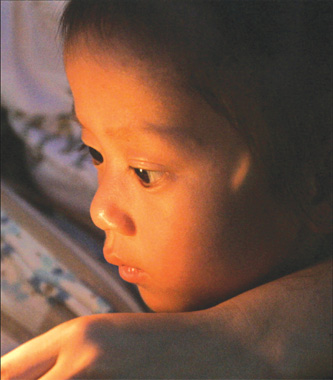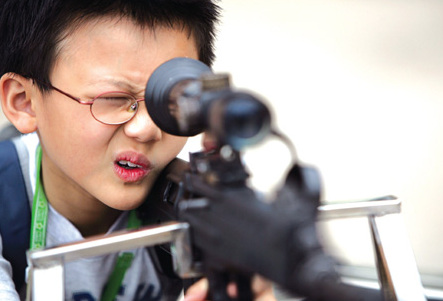Danger lurks at home
Updated: 2010-01-30 07:48
By Bu Yunfei(HK Edition)
|
|||||||||
|
Some parents bring their children everywhere, including potentially dangerous venues, in Hong Kong.Bloomberg News |
We have laws to protect children, but how effective can they be when courts often take the position that "parents know best?" As we learn in this report from Bu Yunfei, leniency toward abusive parents sets a bad example for the community and puts children at greater risk
Hong Kong's children are at risk, but the danger of their becoming victims of violence rests not so much from predators stalking the streets but from a legal system that often fails to protect them from members of their own families.
"The law is basically sufficient, but law enforcement is not effective in child protection. The judges, legal personnel, police etc., still hold a traditional assumption that natural parents are the best caretakers," said Edward Chan Ko-ling, a lecturer in the Department of social work & social administration, University of Hong Kong.
Cathy Dong, an attorney who specializes in family law, says the handling and sentencing of abusers tends to be lenient in cases in which parents are abusers, unless a severe level of violence is involved. Referring to the law, he said, "It is too weak to prevent child abuse from the early stage."
Hong Kong's High Court sentenced a mother to three year's probation, after she had repeatedly shaken adoptive daughter and dropped the child to the floor on her head.
On the night of October 13, 2008, Candy Chan Man-yum, 52, was observed holding her adoptive, mainland-born daughter Chan Yin-tung by her feet. The baby was shaken several times then dropped to the floor again and again. A chef named Lau, who worked in a hotel opposite Chan's home at Yau Ma Tei, witnessed what had happened.
A short time later, Chan was seen wrapping the injured child in a towel. Then she disappeared from view. Yin-tung's heart had stopped beating by the time Candy Chan took the child to Kong Wah Hospital. Chan claimed the injuries were caused by the toddler's falling from a bed. Emergency physicians were able to restore hre heartbeat but five days later, the little girl died.
The abnormal injuries to the girl's body raised doubts in one of the attending physicians concerning Chan's account of the injuries. Police began an inquiry into the cause of death. Chan finally confessed that she caused the injuries to her daughter after becoming infuriated over the child's crying. A month later, a psychiatric assessment declared Candy Chan suffered from bi-polar disorder, which was deemed the probably cause of her violent outburst.
A document provided by the defense, asserted Chan was raped at an early age and became pregnant. She underwent an abortion, suffered from guilt, and then in 2008 decided to adopt. Her application to adopt the child was accepted. That year Chan lost her savings, about HK$3 million during the global financial crisis.
Chan was described as remorseful for her actions. Judge Judianna Bares Wai-ling said at sentencing that homicide cases of this sort merited heavy punishment. Then she added, "After considering Chan's mental illness, her past record of helping others and the pain from losing her daughter, I decided a probation order would be suitable." Chan was given three year's probation.
"The tragedy could be prevented if the mentally ill mother had been treated in time," Judge Bares pointed out.
Instead of arguing whether the sentence was just, Fozia Nazir Lone, assistant professor of the School of Law, at Hong Kong City University, said what should be kept in view are the holes in the legal procedures for child adoption, which make kids vulnerable at the very beginning.
Dr. Lone commented that complete personal, financial as well as mental assessment of an adoptive parent are the most important to secure a child's future well being. In this case, Candy Chan's history of having suffered sexual abuse, undergone an abortion and the financial pressure she felt at the time made her unsuitable as an adoptive parent. Adoption services should have known that a child would be under a potential threat of abuse if Chan was the adoptive parent," said Dr. Lone, adding, "Even after the adoption was allowed it was necessary for them (the authorities) to get involved and check the adoptive baby's condition through family visits in the first year."
"Lack of comprehensive child protection legislation is a lacuna in the effective prevention of child abuse and this case should be an eye opener for government. A separate ordinance to protect and prevent child abuse should not be delayed," said Dr.Lone.
|
A child peeps through the sight of an automatic rifle at the PLA garrison in Hong Kong. Bloomberg News |
Despite establishing a better "sheltering" legal system in order to reduce the possibility of children becoming the victims of abuse, some children's advocacy groups want the courts to mete out punishments that are not only stringent, but as exemplary. These advocates say stiff sentences could reduce the likelihood of such tragedies happening in the future. Referring to the Hong Kong penal law, the heaviest penalty for child abuse is imprisonment for three to ten years. However, a review of the sentencing history reveals courts tend toward leniency. Most offenders were bound over or placed on probation. A father who forced his nine-year-old son to parade naked through a street was bound over for two years.
The director of "Against Child Abuse", Lui Tsang Sun Kai questioned whether such leniency is likely to rehabilitate the parent and serve as a safeguard against further tragedy.
Compared to what prevailed in the 1970's and 1980's, the current court system in Hong Kong tries to focus on highlighting awareness on matters of child protection. The law has provided various criminal (Crimes Ordinance Cap 200) and civil law (within the Domestic Violence Ordinance, Protection of Children and Juveniles Ordinance, Cap 213) remedies in cases of child abuse. It also includes remedies for child neglect and child prostitution. Even the Court of First Instance can exercise its jurisdiction to make an infant a ward of the court, to assume parental rights that provides protection to infants. (Sec 26, High Court Ordnance, Cap 4).
As the Deputy Secretary General of the Council of Europe, Maud de Boer-Buquicchio said, children are not mini-persons with mini-rights, mini-feelings and mini-human dignity. They are vulnerable human beings with full rights that require more, not less protection. Recognition of the child's helplessness is a first step for authorities to begin to mount better safeguards. In September, the Judiciary of Hong Kong decided to set up a special working group focusing on protecting the rights of children. The new reform will devote itself to improve legal process and becomes more "children-centric". "Now the legal, and perhaps all child protection procedures will need to have the child's participation." said Prof. Angela Tsun from the Social Work Department of Hong Kong Baptist University, "a process that can hear voices from child and even family should be formulated."
Family Court judge Sharon Melloy admitted this reform is "long overdue" and believes the group will be a high-powered body.
It will start working soon.
(HK Edition 01/30/2010 page3)

